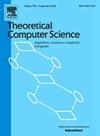Securing data in the cloud using pairing-free inner product functional encryption with unbounded vector size
IF 0.9
4区 计算机科学
Q3 COMPUTER SCIENCE, THEORY & METHODS
引用次数: 0
Abstract
Cloud computing has emerged as a paradigm shift from traditional computing, enabling data processing, storage, and sharing in potentially insecure environments with applications across sectors such as healthcare, online data storage, media platforms, big data analytics, and e-learning. An advanced cryptographic primitive called inner product functional encryption (IPFE) for the linear function class offers fine-grained access control for sensitive cloud storage, with significant applications in the Internet of Things (IoT), network privacy, mobile device security, cloud security, healthcare access control, and more. Most IPFE schemes compute inner products for fixed-length vectors, requiring predefined bounds on message and key vector sizes at the parameter generation stage. To address this, Tomida et al. (ASIACRYPT 2018) and Dufour-Sans et al. (ACNS 2019) introduced unbounded IPFE (UIPFE), which allows for flexible vector lengths in key and ciphertext generation. This adaptability extends IPFE's applicability to contexts where vector lengths may vary or be unknown in advance. However, existing UIPFE schemes rely on pairing operations, incurring substantial computational costs. This work addresses these limitations by introducing UIPFE schemes that eliminate the need for pairing operations. Our main contributions are as follows:
- –We propose the first post-quantum secure public-key UIPFE (pubUIPFE) scheme in the random oracle model with adaptive security, leveraging the Learning With Errors (LWE) assumption to reduce computational overhead.
- –We construct a private-key UIPFE (privUIPFE) scheme in the standard model that offers selective security based on the Decisional Diffie-Hellman (DDH) assumption, featuring linear-size ciphertexts and constant-size keys.
求助全文
约1分钟内获得全文
求助全文
来源期刊

Theoretical Computer Science
工程技术-计算机:理论方法
CiteScore
2.60
自引率
18.20%
发文量
471
审稿时长
12.6 months
期刊介绍:
Theoretical Computer Science is mathematical and abstract in spirit, but it derives its motivation from practical and everyday computation. Its aim is to understand the nature of computation and, as a consequence of this understanding, provide more efficient methodologies. All papers introducing or studying mathematical, logic and formal concepts and methods are welcome, provided that their motivation is clearly drawn from the field of computing.
 求助内容:
求助内容: 应助结果提醒方式:
应助结果提醒方式:


